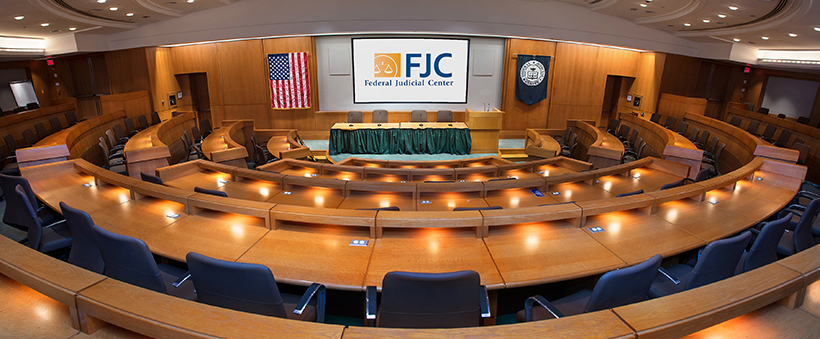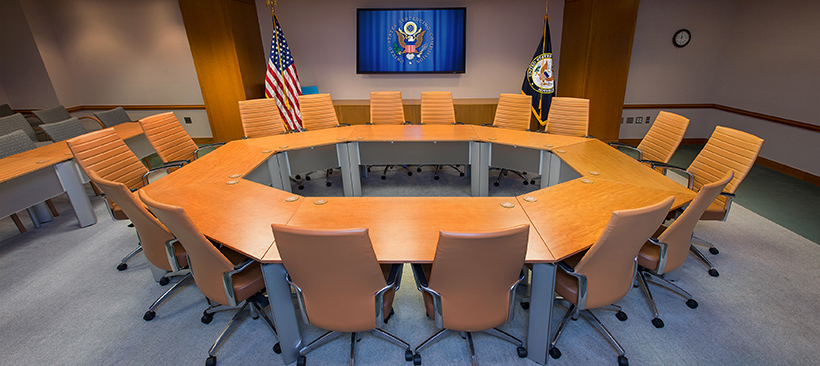Fellowship Placements
Each Fellow will be based at and immersed in the work of a national institution of the federal judiciary.
The Supreme Court of the United States building in Washington, D.C.
Supreme Court of the United States
The Supreme Court is not only a vital component of American government, but also an international symbol of the rule of law that attracts scores of official foreign delegations each year.
The Fellow based at the Supreme Court is assigned to the Office of the Counselor to the Chief Justice and has primary responsibility for briefing foreign jurists, court administrators, and other dignitaries on the operation, procedures, and history of the Court. The Fellow gains exposure to foreign legal systems, including those in developing nations, through direct contact with foreign judges and court officials. The Fellow also assists in the general activities of the Counselor’s Office, which supports the Chief Justice in his administrative and policy functions as head of the judiciary. This fellowship is ideally suited for individuals who have an academic interest in foreign legal systems and wish to broaden their knowledge through dialogue and exchange with participants in those systems.
The Fellow assigned to the Supreme Court is expected to produce an article for publication on a topic of international or comparative law and will present it to U.S. judges.

The Thurgood Marshall Federal Judiciary Building houses the Administrative Office, the Federal Judicial Center, and the U.S. Sentencing Commission
Administrative Office of the U.S. Courts
The Administrative Office of the U.S. Courts provides program management, legal counsel, legislative services, and administrative support
to the federal courts and their policy-making body, the Judicial Conference.
The Fellow placed at the Administrative Office may assist one or more of the Judicial Conference Committees in developing policies related to a variety of areas of court administration, including rules of civil procedure, criminal procedure, and evidence. The Fellow also supports the general operations of the Administrative Office. This fellowship, which provides a unique vantage point for observing how federal judicial policies and rules are formulated, is designed for individuals who have an academic or practical interest in judicial administration, litigation, and legal procedure.
The Fellow assigned to the Administrative Office is expected to produce an article for publication on a topic of legal practice or procedural reform and will present it to U.S. judges.

The Federal Judicial Center Auditorium
Federal Judicial Center
The Federal Judicial Center is the education and research agency for the federal judiciary. It provides orientation and continuing education for all federal judges, and management and supervisory education for court staff. The Center’s projects span a broad range of topics, including practice-oriented legal education on specific subjects, such as patent law, scientific evidence, or arbitration, and empirically based studies in judicial reform.
The Fellow serving at the Federal Judicial Center supports the Center’s research and educational activities, including its international training programs. This fellowship does not focus on a discrete subject matter, such as comparative, procedural, or criminal law. It is fashioned for individuals who have a broad interest in legal teaching or practical programs for legal reform.
The Fellow assigned to the Federal Judicial Center is expected to produce a work of scholarship for publication on a topic relating to the education or research programs of the Center and will present it to U.S. judges.

The U.S. Sentencing Commission Hearing Room
U.S. Sentencing Commission
The U.S. Sentencing Commission engages in policy analysis of crime and punishment at the national level and uses the results in the development of federal sentencing guidelines.
The Fellow serving at the Sentencing Commission participates in professional teams conducting policy, legal, and social science research on the cutting edge of criminal sentencing reform. The breadth of the Commission’s work and the relatively small size of its staff provide the Fellow with both a wide-ranging exposure to criminal law and opportunities for active participation in addressing sentencing issues. This fellowship is ideally suited to individuals with an academic or practice-oriented interest in criminal law.
The Fellow assigned to the Sentencing Commission is expected to produce a work of scholarship for publication on a topic of criminal or sentencing law and will present it to U.S. judges.